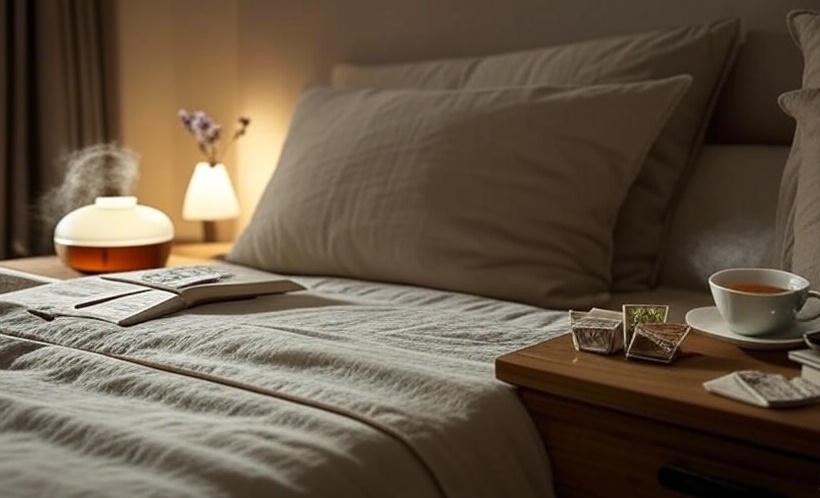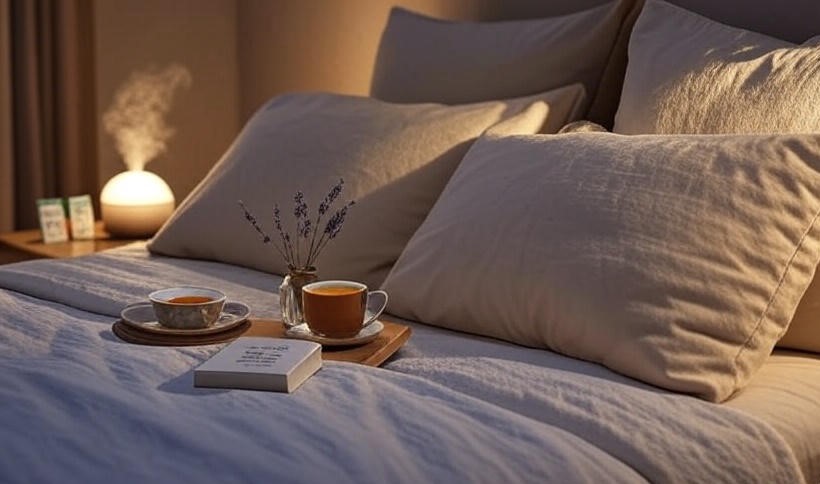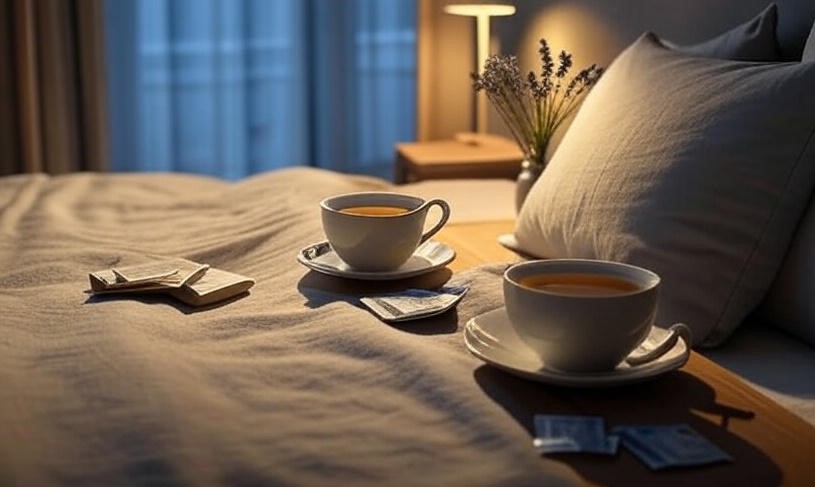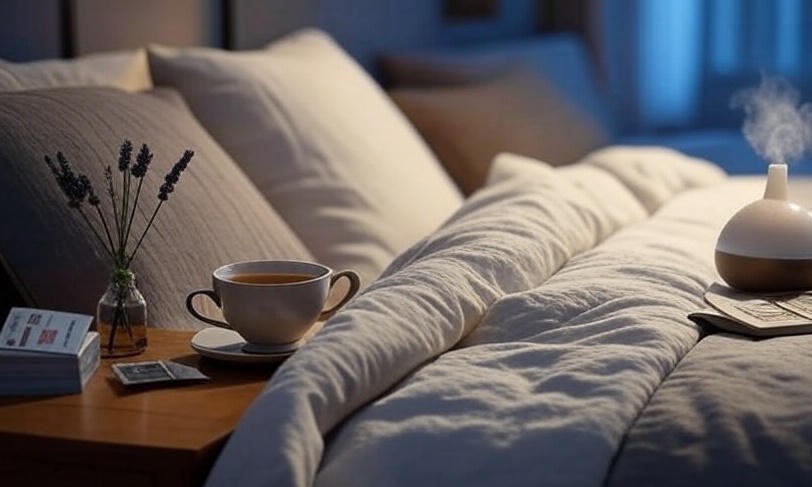A good night’s sleep is one of the most underrated foundations of health. While diet and exercise often steal the spotlight, sleep quietly governs our mood, memory, productivity, immune system, and even our lifespan. And yet, for millions, quality sleep is elusive. According to the CDC, about one-third of adults in the U.S. report getting less than the recommended seven hours per night.
For some, the solution is to reach for prescription sleeping pills—but these can bring side effects, dependency concerns, and a diminishing return over time. That’s why more and more people are exploring Natural Sleep Aids That Actually Work—approaches that support the body’s own sleep mechanisms without harsh chemicals or habit-forming drugs.
In this guide, we’ll explore the most effective natural remedies—herbs, supplements, foods, and habits—supported by research, and explain how to use them safely and effectively.
The Science of Sleep: Why It Matters
Table of Contents
ToggleSleep is not simply “switching off” for the night—it’s an active, complex process that restores your brain and body. Understanding this process makes it easier to choose the right natural aid.
How Sleep Works
Your body’s sleep cycle is regulated by two main systems:
-
Circadian Rhythm – Your internal 24-hour clock, influenced by light exposure, body temperature, and hormones like melatonin.
-
Homeostatic Sleep Drive – A pressure to sleep that builds up the longer you are awake, regulated partly by the neurotransmitter adenosine.
When either of these systems is disrupted—by stress, irregular schedules, caffeine, screen time, or underlying health issues—falling asleep and staying asleep becomes harder.
Why People Turn to Natural Sleep Aids
People look for natural options for several reasons:
-
Fewer side effects compared to prescription medications
-
Non-addictive nature of most natural remedies
-
Support for long-term use in some cases
-
Holistic approach—addressing stress, nutrition, and lifestyle
Categories of Natural Sleep Aids That Actually Work
We can divide natural sleep aids into three main categories:
-
Herbal and Plant-Based Supplements – Derived from plants traditionally used for relaxation and sleep.
-
Nutrients, Hormones, and Amino Acids – Essential compounds that influence sleep-related brain chemistry.
-
Lifestyle and Environmental Strategies – Non-ingestible methods to promote deep, restorative sleep.
Let’s explore each in depth.
Herbal and Plant-Based Sleep Aids
-
Valerian Root
What it is: A flowering plant whose root has been used medicinally since ancient Greece and Rome.
How it works: Believed to increase GABA (gamma-aminobutyric acid) activity in the brain, calming the nervous system and reducing the time it takes to fall asleep.
Evidence: Multiple studies suggest valerian can modestly improve sleep quality, particularly after 2–4 weeks of regular use.
How to use: Standardized extract, 300–600 mg, 30 minutes to 2 hours before bedtime.
Cautions: Some users report mild headaches or dizziness.
-
Chamomile
What it is: An herb most commonly consumed as tea, known for its soothing aroma.
How it works: Contains apigenin, an antioxidant that binds to certain brain receptors, promoting relaxation.
Evidence: Clinical trials have shown chamomile tea can improve sleep quality, particularly in older adults and postpartum women.
How to use: Brew a strong cup of chamomile tea 30–45 minutes before bed.
Cautions: Avoid if allergic to ragweed.
-
Lavender
What it is: A fragrant herb used in aromatherapy, teas, and essential oils.
How it works: The scent may reduce blood pressure and heart rate, signaling the nervous system to prepare for rest.
Evidence: Aromatherapy with lavender oil has been shown to improve sleep quality in people with mild insomnia.
How to use: Diffuse lavender essential oil in your bedroom or place a few drops (diluted in carrier oil) on your pillow.
-
Passionflower
What it is: A vine plant used traditionally for anxiety and insomnia.
How it works: May increase GABA levels in the brain, calming neural activity.
Evidence: Drinking passionflower tea has been associated with slight improvements in sleep duration and quality.
How to use: Tea or capsule form, 250–500 mg before bed.
-
Lemon Balm
What it is: A lemon-scented herb from the mint family.
How it works: Mild sedative properties and potential GABA-enhancing effects.
Evidence: Often combined with valerian in sleep formulas; some trials show improved sleep quality and reduced restlessness.
-
Ashwagandha
What it is: An adaptogenic herb from Ayurvedic medicine.
How it works: Reduces cortisol levels and stress-related wakefulness.
Evidence: Recent studies suggest it can improve sleep onset and quality in people with insomnia.
Nutrients, Hormones, and Amino Acids
-
Magnesium
Role: Regulates melatonin production, supports muscle relaxation, and calms the nervous system.
Evidence: Supplementation helps older adults and people with low magnesium improve sleep duration.
How to use: 200–400 mg magnesium glycinate or citrate in the evening.
-
Glycine
Role: An amino acid that helps lower core body temperature, signaling the body it’s time to sleep.
Evidence: A 3-gram dose before bed can improve subjective sleep quality.
-
Melatonin
Role: The “sleep hormone” that aligns circadian rhythms.
Best for: Jet lag, shift work, delayed sleep phase disorder—not as effective for chronic insomnia.
How to use: 0.5–3 mg, 30–60 minutes before bedtime.
-
L-Theanine
Role: Promotes calmness without sedation, often used to smooth caffeine’s stimulating effects.
Evidence: Shown to reduce anxiety and promote deeper sleep when taken before bed.
-
5-HTP (5-Hydroxytryptophan)
Role: A precursor to serotonin, which can then convert to melatonin.
Evidence: May help improve sleep in cases where low serotonin is a factor.
Lifestyle and Environmental Strategie
-
Consistent Sleep Schedule
Go to bed and wake at the same time every day, even on weekends, to train your circadian clock.
-
Sleep-Friendly Environment
-
Darkness: Blackout curtains or an eye mask.
-
Temperature: 60–67°F is ideal.
-
Sound: Use white noise or earplugs to block disruptions.
-
Bedtime Routine
Signal your body it’s time to wind down—dim the lights, read a book, stretch, or meditate.
-
Limit Stimulants
Avoid caffeine after early afternoon and nicotine close to bedtime.
-
Manage Screen Time
Blue light suppresses melatonin—switch to dim, warm lighting an hour before bed.
-
Mindfulness and Relaxation
Meditation, progressive muscle relaxation, and slow breathing can all trigger sleepiness.
Building a Sleep Plan
An effective sleep plan often combines:
-
One or two gentle supplements
-
A consistent bedtime routine
-
Environmental changes that remove barriers to rest
Example: 30 minutes before bed, take magnesium and sip chamomile tea, dim lights, avoid screens, read a calming book, then enter a cool, dark bedroom.
Safety Considerations
Natural doesn’t mean risk-free.
-
Interactions: Some herbs and supplements interact with medications (e.g., sedatives, antidepressants).
-
Dosage: More is not always better—follow evidence-based ranges.
-
Medical conditions: Consult a healthcare provider before starting new remedies.
Common Myths About Sleep Aids
-
“Natural means safe for everyone.” Not always—some herbs can be risky for pregnant individuals or those with certain conditions.
-
“If it works, take it forever.” Long-term use isn’t always necessary or advisable.
-
“One solution works for all.” Sleep issues have many causes; personalization is key.
Troubleshooting Sleep Problems
If you’ve tried several remedies without success:
-
Keep a sleep diary to track patterns.
-
Address underlying causes like stress, chronic pain, or sleep apnea.
-
Consider Cognitive Behavioral Therapy for Insomnia (CBT-I), which has strong long-term effectiveness.
FAQs
1. How soon will I see results with natural sleep aids?
Some, like melatonin, work within an hour. Others, like valerian or ashwagandha, may take weeks.
2. Can I combine different sleep aids?
Yes, but start with one at a time to assess tolerance.
3. Are they safe for older adults?
Many are, but dosage and interactions should be carefully managed.
4. Do lifestyle changes matter as much as supplements?
Yes—supplements are most effective when paired with healthy sleep habits.
5. What if my insomnia is severe?
Seek medical advice—persistent insomnia may signal a deeper health issue.
Conclusion
Sleep is not just rest—it’s an active process that repairs the brain and body, consolidates memory, regulates mood, and supports nearly every system in your body. While modern life challenges our ability to sleep well, Natural Sleep Aids That Actually Work—from valerian root to magnesium, from lavender oil to structured bedtime routines—offer safe, sustainable solutions for many people.
By understanding how these remedies work, using them wisely, and pairing them with good sleep hygiene, you can restore deep, restorative rest and wake ready to meet each day.












